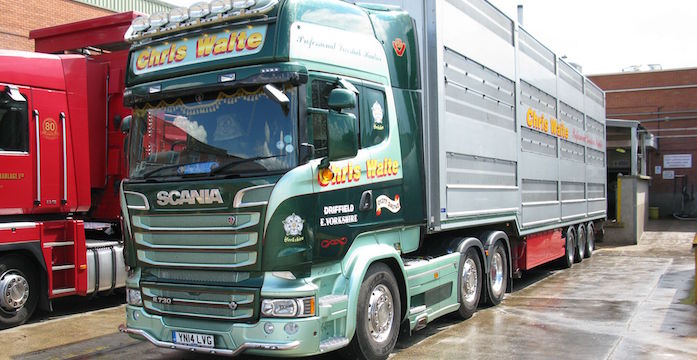Defra has unveiled changes to the rules governing the transport of animals, including shorter journey times, more headroom, and stricter rules regarding temperatures.
The changes, which will accompany the ban on live animal exports for slaughter and fattening, which is currently going through Parliament, will have an impact on the pig sector, although Defra has listened to industry concerns in some key areas.
The new proposals, which are being developed in partnership with the farming industry will apply to animals being transported within England and Wales.
A number of changes have been made, after industry organisations, including the NPA and the NFU, issued strong objections to the original proposals, which they argued would be impractical to implement, with little clear evidence they would deliver welfare benefits.
According to NPA senior policy adviser Rebecca Veale, the key changes affecting the pig sector include:
- A maximum journey time of 18 hours for pigs with an exception for breeding pigs if additional criteria are met (to be agreed with stakeholders).
- A maximum journey time of 12 hours for newly weaned pigs, in line with scientific evidence and, taking on board comments from industry, to allow pigs to receive necessary vaccinations during unloading in order to minimise handling.
- For livestock and horses, Government will prohibit short journeys of less than 8 hours where the external temperature is above 30°C. Long journeys of over 8 hours would be prohibited where the external temperature is outside of 0 to 25°C. In both cases, journeys could take place outside these ranges if the vehicle is able to regulate the internal temperature within this range for the duration of the journey by means of a thermo-regulation system.
- Government will not take forward the proposed lower temperature limit for short journeys and will decrease the proposed lower temperature for long journeys to 0°C.
- Government to introduce new headroom allowances of 10cm above head height for pigs and 20cm above head height for all other animals. Many pig industry representatives stated that a lot of headroom was not required by pigs, as they commonly lie down during transport.
- For sea transport, Defra agreed there is not enough evidence to make specific decisions on transporting animals in Beaufort Wind Force 6 or above. The decision on whether to allow live animals to travel on a Roll-on Roll-off ferry in extreme weather will therefore be left to the discretion of the ship’s captain.
You can read Defra’s full response to the consultation on improvements to animal welfare in transport HERE
These new conditions would apply to all journeys over 65km. Defra said independent evidence has shown that very long journeys can cause heat stress, dehydration and physical injuries in transported animals such as horses, pigs, sheep, poultry and cattle.
But it stressed that the Government has listened to early feedback from industry and would now work with the farming sector and welfare groups to develop these proposals and ‘prepare for the transition to the higher standards to build on the high-welfare outcomes already being delivered on farms across England and Wales’.
Reaction
Defra Secretary George Eustice said: “We are legislating to ban the export of live animals for slaughter and fattening, and are now developing other measures to improve the welfare of animals during transport.
“We have listened to the concerns raised relating to our proposed changes to transport regulations and have made changes to address these. We will continue to work with industry on the remaining details.”
Ms Veale said: “We are pleased that Government has clearly listened to our and our members’ concerns and acknowledged the practicalities of transporting pigs in this country and the knock-on implications this can have for pig welfare.
“There are, however, specific areas where although Defra has made changes to policy, we need to consider the subsequent impact on the pig sector. As always, it is vital that policy is based on science and evidence, taken together with practical considerations.
“This will allow policy to move forward in a sensible manner and raise the already high standards of welfare met by producers today. The recognition of this by Defra is welcome and we will continue to engage with them on the various areas of importance.”
You can read more on how NPA lobbying shaped the proposals HERE
RSPCA chief executive Chris Sherwood said the ban on live exports was ‘a victory for every single person who has signed a petition, demonstrated at the docks, written to their MPs and leaders and most importantly for the animals’.
“We also welcome tighter controls over transporting live animals within Great Britain as it’s a time when they can suffer stress and injury and their welfare needs to be protected,” he said.
The announcement follows a twelve-week consultation launched in December, which sought industry and public views on proposals to improve animal welfare in transport.




